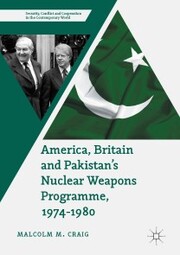Detailansicht
America, Britain and Pakistan's Nuclear Weapons Programme, 1974-1980
eBook - A Dream of Nightmare Proportions, Security, Conflict and Cooperation in the Contemporary World
ISBN/EAN: 9783319518800
Umbreit-Nr.: 4549719
Sprache:
Englisch
Umfang: 0 S., 5.47 MB
Format in cm:
Einband:
Keine Angabe
Erschienen am 26.06.2017
Auflage: 1/2017
E-Book
Format: PDF
DRM: Digitales Wasserzeichen
- Zusatztext
- <div><p>This book analyses US and UK efforts to shut down Pakistans nuclear programme in the 1970s, between the catalytic Indian nuclear test of May 1974 and the decline of sustained non-proliferation activity from mid-1979 onwards. It is a tale of cooperation between Washington and London, but also a story of divisions and disputes. The brutal economic realities of the decade, globalisation, and wider geopolitical challenges all complicated this relationship. Policy and action were also affected by changes elsewhere in the world. Irans 1979 revolution brought a new form of political Islamic radicalism to prominence. The fears engendered by the Ayatollah and his followers, coupled to the blustering rhetoric of Pakistani leaders, gave rise to the Islamic bomb, a nuclear weapon supposedly created by Pakistan to be shared amongst the Muslim ummah. This study thus combines cultural, diplomatic, economic, and political history to offer a rigorous, deeply researched account of a critical moment in nuclear history.</p><p>&nbsp;</p></div>
- Kurztext
- This book analyses US and UK efforts to shut down Pakistan's nuclear programme in the 1970s, between the catalytic Indian nuclear test of May 1974 and the decline of sustained non-proliferation activity from mid-1979 onwards. It is a tale of cooperation between Washington and London, but also a story of divisions and disputes. The brutal economic realities of the decade, globalisation, and wider geopolitical challenges all complicated this relationship. Policy and action were also affected by changes elsewhere in the world. Iran's 1979 revolution brought a new form of political Islamic radicalism to prominence. The fears engendered by the Ayatollah and his followers, coupled to the blustering rhetoric of Pakistani leaders, gave rise to the 'Islamic bomb', a nuclear weapon supposedly created by Pakistan to be shared amongst the Muslim ummah. This study thus combines cultural, diplomatic, economic, and political history to offer a rigorous, deeply researched account of a critical moment in nuclear history. &nbsp;
- Autorenportrait
- <p><b>Malcolm Craig</b> gained his PhD from the University of Edinburgh in 2014, and has taught at Edinburgh, UK, Victoria University of Wellington, NZ, and is currently Lecturer in History at Liverpool John Moores University, UK. His research focuses on American and British foreign policy in the post-1945 period, with particular interests in national security, nuclear proliferation, state secrecy, and the role of the media.</p>
